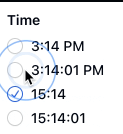





oh, that’s a cool website
adds it to bookmarks and search bookmarks


But did it reach test or production environment yet? Or will it die in development environment.


Even C# has something that few people use, but it has something.
Huh? Are you claiming few people use NuGet?


Read/Inspect and contribute to FOSS. They’ll be bigger and longer lived than small, personal, and experimental projects.
Study computer science.
Work, preferably in an environment with mentors, and long-/continuously-maintained projects.
Look at alternative approaches and ecosystems. Like .NET (very good docs and guidance), a functional programming language, Rust, or Web.
That being said, you ask about “should”, but I think if it’s useful for personal utilities that’s good enough as well. Depends on your interest, goals, wants, and where you want to go in the future.
For me, managing my clan servers and website, reading online, and contributing to FOSS were my biggest contributors to learning and expertise.
Formatted, so I can read it
Exception in thread "main" java.lang.NullPointerException:
Cannot invoke "String.toLowerCase()" because the return value of
"com.baeldung.java14.npe.HelpfulNullPointerException$PersonalDetails.getEmailAddress()" is null
at com.baeldung.java14.npe.HelpfulNullPointerException.main(HelpfulNullPointerException.java:10)


Damn, that’s a long list. Looks like a lot of work to collect and prepare.
I was looking for more of an overview of it and selected them from the headlines:
let a = ''
for (let x of document.querySelectorAll('h3 a[title]')) a += x.title + "\n"
a


Now that you say so, I feel like I’ve read about this before. In comments about Diatraxis/one of them years ago. :)


I like that even here on Lemmy, with inline code format, colors.ini is not being colored but color.ini is. Great symbolism for your issue.


deleted by creator


If you only care about contributing improvements, no, it doesn’t matter.
If you want to at least be recognized as an author, and be able to say “I made this”, the license opposes that.
Waiver of Rights: You waive any rights to claim authorship of the contributions […]
I don’t know how they intend to accept contributions though. I guess code blocks in tickets or patch files? Forking is not allowed, so the typical fork + branch + create a pull request does not work.


libsass.so: cannot open shared object file: No such file or directory (LoadError)
You’re missing the SASS library


I’ve been using TortoiseGit since the beginning, and it covers everything I need. Including advanced use cases. I can access almost all functionality from the log view, which is very nice.
I’ve tried a few other GUIs, but they were never able to reach parity to that for me. As you say, most offer only a subset of functionalities. Most of the time I even found the main advantage of GUIs in general, a visual log, inferior to TortoiseGit.
GitButler looks interesting for its new set of functionalities, new approaches. Unfortunately, it doesn’t integrate well on Windows yet. Asking for my key password on every fetch and push is not an acceptable workflow to me.


That’s less than I expected. If there’s 141 commands that on average comes down to 10 per.


git has 17 million options
proof needed /s
I wonder how many it actually is.
I think using display: grid; as your default is the better default, so you’re all set. :)


Looking at the Web Archive; Diatraxis has been around since 2021. That divio docs since May of this year.
I doubt they didn’t “get inspiration” from Diatraxis.
It baffles me when people use flex layout when it’s clearly visually a grid layout. Nothing here is flexing with varying element sizes and auto-fill-wrap-break of items.

A colleague of mine prefers flex too. But to me, grid is so much more intuitive and simple.
https://css-tricks.com/quick-whats-the-difference-between-flexbox-and-grid/


Using early returns and ternary conditional operator changes
private boolean meetsRiderPreferences(Rider rider, Driver driver) {
if (driver.rating >= 4.5) {
if (rider.preferences.includes('Premium Driver')) {
return driver.isPremiumDriver;
} else {
return true;
}
} else if (driver.rating >= 4.0) {
return true;
} else {
return false;
}
}
to
private boolean meetsRiderPreferences(Rider rider, Driver driver) {
if (driver.rating < 4.0) return false;
if (driver.rating < 4.5) return true;
return rider.preferences.includes('Premium Driver') ? driver.isPremiumDriver : true;
}
dunno if java has them, but in C# switch expressions could put more of a case focus on the cases
private boolean meetsRiderPreferences(Rider rider, Driver driver) {
return driver.rating switch {
< 4.0 => false,
< 4.5 => true,
_ => rider.preferences.includes('Premium Driver') ? driver.isPremiumDriver : true,
};
}
or with a body expression
private boolean meetsRiderPreferences(Rider rider, Driver driver) => driver.rating switch {
< 4.0 => false,
< 4.5 => true,
_ => rider.preferences.includes('Premium Driver') ? driver.isPremiumDriver : true,
};
The conditional has a true result so it can be converted to a simple bool condition as well.
private boolean meetsRiderPreferences(Rider rider, Driver driver) => driver.rating switch {
< 4.0 => false,
< 4.5 => true,
_ => !rider.preferences.includes('Premium Driver') || driver.isPremiumDriver,
};
For me that’s the wrong way around.
I want to be able to fix the issues I see. I hate it when I can’t.